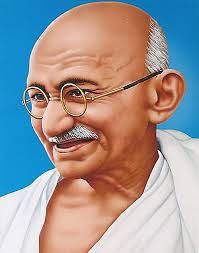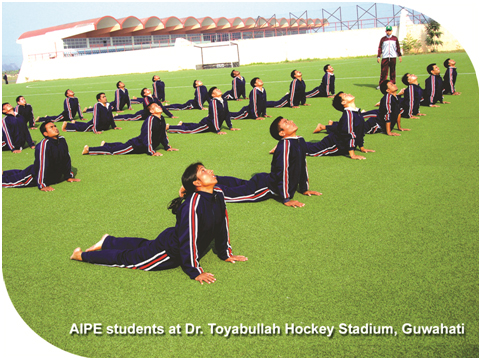- Call Us9435100098
- Apply Now

Mahatma Gandhi, the Father of the Nation had once said, "Education means all-round drawing out of the best in child and man - body, mind and spirit." As such, Physical Education becomes the basic foundation of overall personality development in all dimensions - moral, mental, emotional and physical.
Gandhiji had also said - It is health that is real wealth, and not the pieces of gold and silver.
Introduction of Physical Education at the primary and secondary school level would not only contribute to the immediate physical fitness and good health of children, but also help the young people grow up to become responsible citizens. Physical education is one way of inculcating good habits from a young age because it is also about discipline in life. It has been always said that a healthy body gives shape to a healthy mind, and investing in physical education thus will have lasting positive impact on one's life.
Moreover, introduction of Physical Education at the school level will help bring about transferable knowledge and skills like teamwork, fair-play, tolerance, and shared responsibility. These in turn would help in cultivating positive cultural habits like respect for others, honouring rights of other people, preparedness for shouldering social responsibility too. This is because Physical Education helps in providing young people a general understanding of the "rules of the game" which will almost immediately come handy in real-life situations.
Looking at the huge young human potential that India has emerged as, introduction of Physical Education right from the primary school level and making it compulsory would also help fostering an overall and balanced physical, personal and social development of our future citizens, one that our hon'ble Prime Minister Shri Narendra Modi has been clamouring for. His very purpose of promoting Yoga is based on this concept, and making Physical Education (of which Yoga is an inseparable Indian physical-spiritual component) will only put the government's efforts on a fast-forward mode.
A report prepared for the European Commission has referred to some very interesting aspects and outcomes of making Physical Education compulsory in different countries of that continent. In the Czech Republic and in Germany and Norway for instance, traffic rules for pedestrians and cyclists are part of the physical education curriculum. In the Nordic countries children learn how to make use of maps and other means of orienting themselves in a natural environment. In Germany, the United Kingdom and Portugal, young children are made to explore social and natural sciences as part of the Physical Education curricula, showing how other subjects are inter-related to Physical Education.
Likewise, at states like Punjab and Manipur, where the community as a whole gives maximum importance to physical education and sports activities in the school level, which in turn has made these states leaders in sports and games in the country as well as in the international level. If all states start doing this in a concerted manner, the overall physical and mental development of the young generation will improve significantly, which will be reflected not only in the raised standard of performance in the national sports events, but also take India up in the medal tally in different international sports meets.
The fact that while individual young people from Assam and North-east do occasionally well in various sports and games, they simply wither away because of lack of a sustained programme of physical education which should have started from a young age. If little children take to physical education early in life in the primary school level itself, it will build a strong foundation both at the institutional/ community level as well as at the individual level.
We should see how a small state of North-east like Manipur has carved a niche for itself in the national and international sporting world just because physical development, along with sports and games, has become a mass activity there. Manipur may have a very small population in comparison to most other states of the country. Manipur may have serious law and order problems almost round the year. But when it comes to sports, its performance is simply amazing. The key to this the general interest of the people as a whole in ensuring that maximum number of young people take to physical training and different sports events. India has not been able to create a talent pool for various sports and games just because we have not been able to attract young people towards looking at sports as a career or as an aspect that would boost an individual's career prospect in any other field of activity.
With these fact that Physical Education was a key human development indicator in the developed world, and all those developed countries that do well in all other development indicators also do well in various international sports events including the Olympic Games. The key to such high degree of success, lay in the fact that the developed countries emphasise on over-all physical education and physical development of all its young people, and do not engage in just training up a handful of sportspersons with the sole intention of taking part and winning medals in international sports meets including the Olympic Games.

In this context, we would also humbly request to the North East Council to kindly take a look at the UNESCO's "World-wide Survey of School Physical Education" published in 2014.